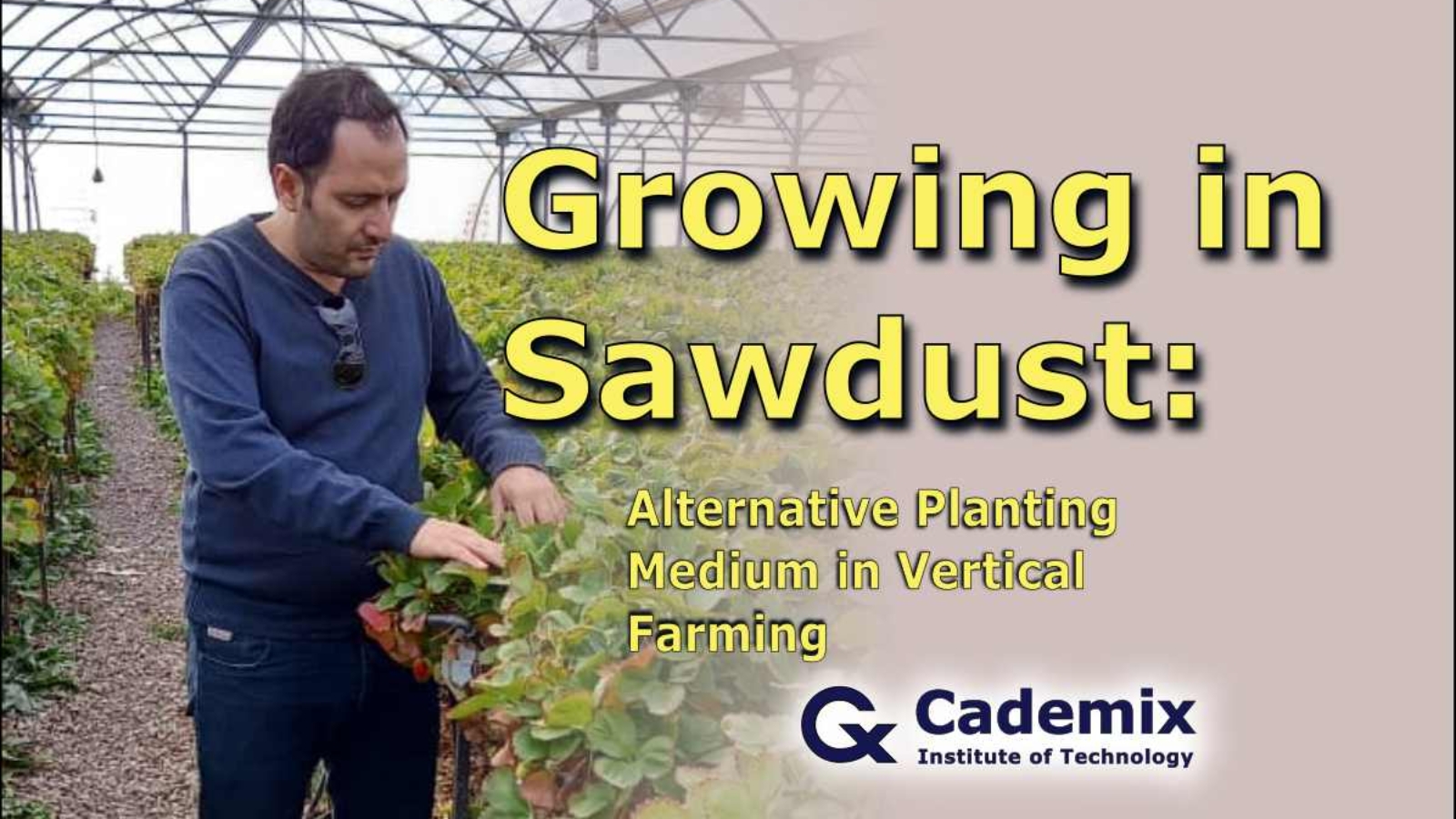In this study we examined growing in sawdust as a media in transplant production. It is an alternative to coco peat as a conventional seedling culture media, where we specifically use it in vertical farming conditions with artificial light. We further report a series of experiments for various seeds germination in different arrangments.
By Hossein Nazarian, Cademix Institute of Technology
Importance of Food Supplying
Conserving Environmental Resources (Growing in Sawdust)
Ensuring food security has always been one of the most important concerns in human societies. For instance, given the increasing population growth in the world and the limitation of production resources in agriculture, the issue of sustainable production by relying on conserving environmental resources and increasing energy efficiency is of great significance or value. To achieve these goals, new and creative approaches as Vertical Farming are vital to feed the world in the future. Therefore, in terms of agricultural strategies the choice of cultivation system in the form of seedling transfer has considerable importance. First, it leads to creating control over the time of product supply to the market. Second, it reduce the stoppage time of crops in the lands and consequently increasing planting times per year and also significantly decrease the consumption of resources such as water and soil.
One of the numerous advantages of controlled environment agriculture over traditional agricultural methods is the conservation of water and nutrients. Advanced agricultural techniques include hydroponics, aquaponics, and other soilless farming systems effectively avoid water waste and nutrient misuse.
In this study, we investigate the quality of using sawdust as a free and available culture medium compared to coco peat as a conventional seedling culture media in seedling production through Vertical Farming with artificial light.
Why Growing in Sawdust?
Applying vigorous seedlings (healthy and free of pests and diseases seedlings with full roots planted in planting trays) is the key to success in the proper placement of seedlings in the main land. So, the use of sawdust as a planting medium can draw the attention of growers to one of the sources of reducing seedling production costs. However, in various sources, sawdust has considered as a culture medium, but in practice, its characteristics should be considered for economic production.
It seems that the high Cation Exchange Capacity (CEC) of sawdust provides a suitable situation for seedling production. On the other hand, seedlings in the early growth stages do not need to large amount of elements. Therefore, the release of elements due to sawdust decomposition should consider by growers. Further in this study, cultivation of melon, tomato, lettuce and watermelon in sawdust as a culture medium in terms of germination percentage and growth status through artificial light were investigated. Finally, it is expected that sawdust with rough vestige has a different responses to fine sawdust which sifted and has a high compact grading.
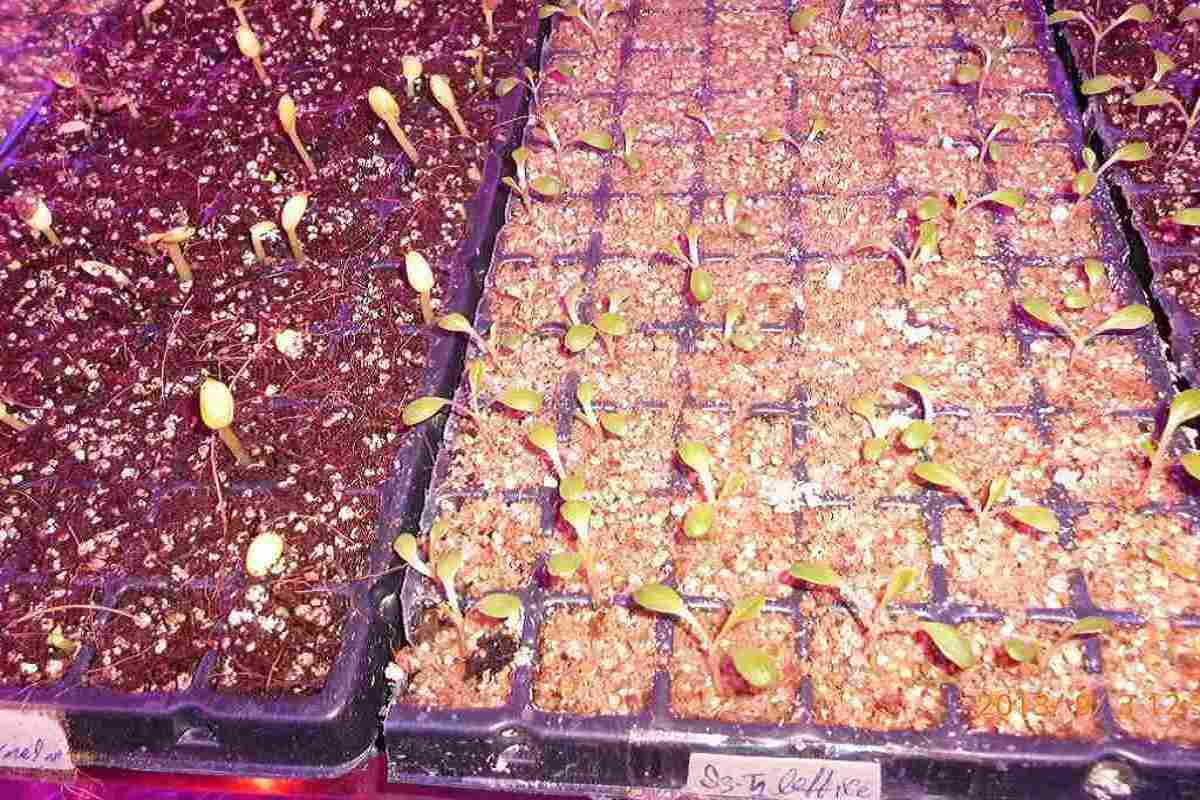
| Depth of pots / cm | Tray dimensions / cm | Number of pots in each tray | Material of the tray |
| 5 | 32*47 | 216 | Polystyrene |
| Seed type | Planting media | Trays no. |
| Lettuce | Sawdust | 2 |
| Lettuce | Coco peat | 2 |
| Lettuce | Fine sawdust- Sifted | 2 |
| Tomato | Sawdust | 2 |
| Tomato | Coco peat | 2 |
| Melon | Sawdust | 2 |
| Melon | Coco peat | 2 |
| Watermelon | Sawdust | 2 |
| Watermelon | Coco peat | 2 |
| Watermelon | Fine sawdust- Sifted | 2 |
Germination conditions
Table 1 shows the seeds placed in trays containing the culture medium. specifically we have irrigated them with subsurface irrigation through drainage holes at the temperature of 26-25 ° C in the growth chamber under the plastic to maintain humidity and temperature. Then exposed to visible light 80-55 Micromoles / m2 / s and 14 hours daily photoperiods. The growth status report is shown in Table 3:
| Seed type | Planting media | Days after planting | Germination percentage |
| Lettuce | Sawdust* | 5 | 11 |
| Lettuce | Sawdust | 7 | 46 |
| Lettuce | Sawdust | 9 | 74 |
| Lettuce | Coco peat | 5 | 33 |
| Lettuce | Coco peat | 8 | 93 |
| Lettuce | Fine sawdust- Sifted | 5 | 0 |
| Lettuce | Fine sawdust- Sifted | 8 | 0 |
| Tomato | Sawdust | 5 | 13 |
| Tomato | Sawdust | 7 | 68 |
| Tomato | Sawdust | 9 | 96 |
| Tomato | Coco peat | 5 | 72 |
| Tomato | Coco peat | 8 | 100 |
| Melon | Sawdust | 5 | 33 |
| Melon | Sawdust | 9 | 90 |
| Melon | Coco peat | 5 | 75 |
| Melon | Coco peat | 9 | 95 |
| Watermelon | Sawdust | 6 | 30 |
| Watermelon | Sawdust | 11 | 72 |
| Watermelon | Coco peat | 6 | 63 |
| Watermelon | Coco peat | 11 | 95 |
| Watermelon | Fine sawdust- Sifted | 6 | 46 |
| Watermelon | Fine sawdust- Sifted | 11 | 84 |
* A mixture for growing in sawdust derived from hardwood and Russian wood
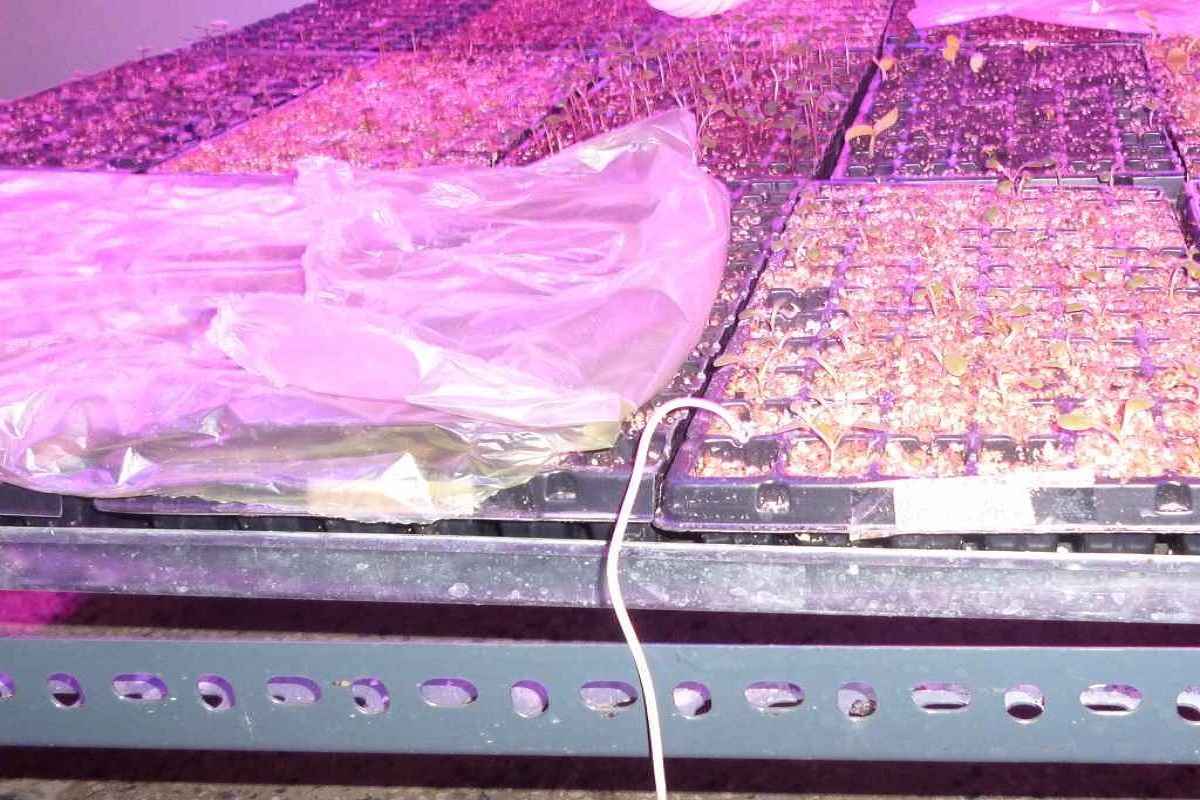
Growth material and methods
Irrigation and Fertigation when Growing in Sawdust
In the table 4, Water and Fertigation (irrigation water+dissolved nutrition) quality has revealed. It is remarkable that seedlings until cotyledon leaves emergence irrigated with just water. A cotyledon is a portion of a plant’s embryo that is defined as the embryonic leaf of seed-bearing plants, one or more of which are the first to develop from a germinating seed. In order to provide nutritional elements, immediately after appearance of true leaves (exactly two primary leaves), the trays irrigated with fertilizers.
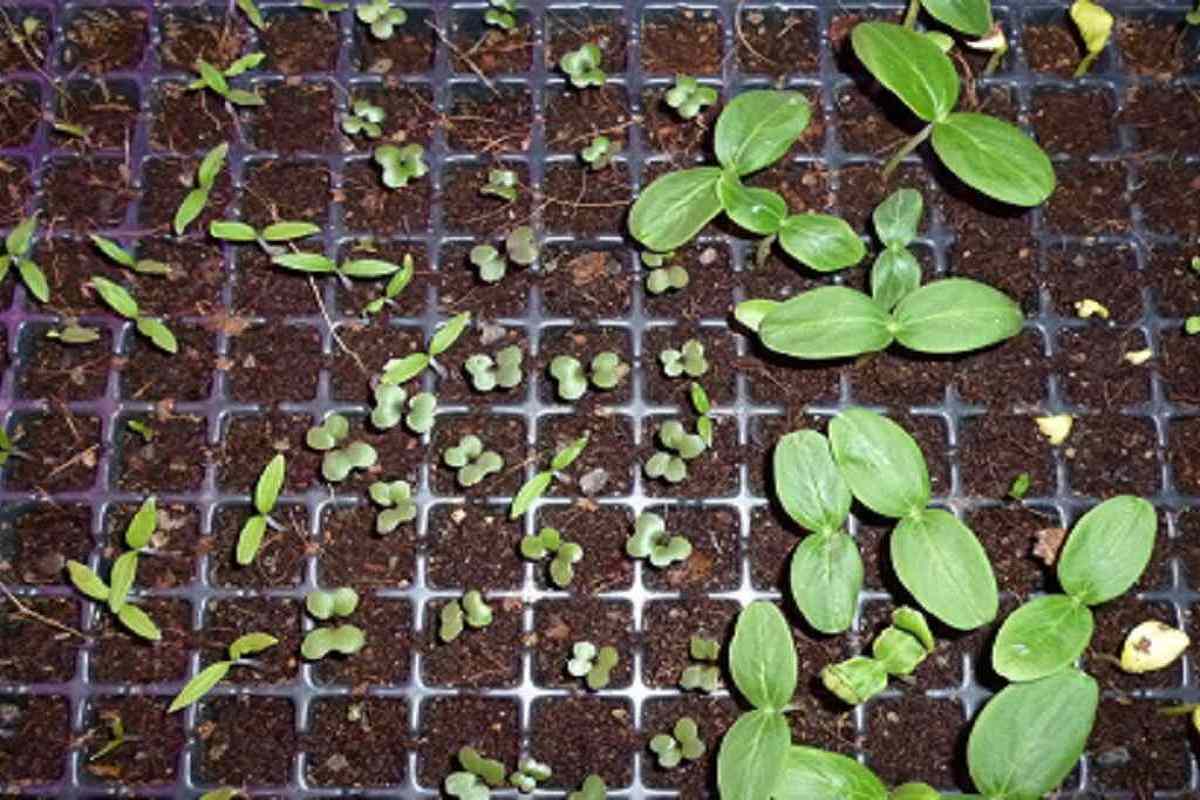
| Growth stage | PH | TDS/ppm | EC micromhos/cm |
| Cotyledon | 7.2 | 163 | 330 |
| Two primary lives | 5.8 | 847 | 1700 |
Artificial light in Vertical Farming
Due to artificial light is the only source of light in Vertical Farming, light intensity and spectrum are more important than in a greenhouse. It is also very important topic in the other fields such as modern architecture. All seeds after about 70% germination in the growth chamber translocated under greenhouse conditions with artificial light. Consequently, exposed to an average light of 250 μmol / m2 / second and kept moist until full germination by misting. The feeding system done by subsurface irrigation through drainage holes, so that the planted trays were placed inside a pond made of galvanized sheet and the water containing nutrients transferred to the pond using the pressure difference caused by the height from the tank. The concentrations of the elements are given in Table 5.
| Elements | Concentration/ ppm | Source of supply |
| N | 100 | NO3, NH4,KNO3, CaNO3, 10-50-10 |
| P | 25 | 10-50-10 |
| K | 150 | KNO3, K2SO4 |
| Mg | 30 | MgSO4 |
| Ca | 100 | CaNO3 |
| S | 65 | MgSO4, K2SO4 |
| Fe | 2.5 | Fe(EDTA) |
| Zn | 0.5 | ZnSO4 |
| Mn | 0.4 | MnSO4 |
| Cu | 0.035 | CUSO4 |
| B | 0.15 | H3BO3 |
| Mo | 0.025 | (NH4)6MO7O24 |
Our Results of Growing in Sawdust Experiment
Germination
Regarding to the germination status report in table 3, lettuce seeds in coco peat had a significant effect on the best germination (93%). And fine sawdust (sifted) was not found significant and its germination was zero.
Based on the obtained results (Table 3), among examined medium, coco peat had the greatest impact on the fast and complete germination (100% germination on the eighth day). Although the result derived from sawdust was also considerable (96%).
According to table 3, melon seeds in coco peat had just 5% better germination than sawdust and the results were almost the same (respectively 95% versus 90%).
Based on the indicated results (table 3), about the germination of watermelon, best effect obtained from coco peat as a media (95%). Furthermore, germination percentage in fine sawdust (sifted) was 84%. Also germination in sawdust media was 72%.

Transplant production through Vertical Farming
To sum up, due to the lack of proper response in water retention variation in holes of the trays that was attributed to non-uniformity of sawdust as a medium, related examined seeds after germination through this experiment did not lead to plantlet production. Specifically, the Coco peat as a conventional planting medium had the best results in achieve to the desired results that conducted to seedlings production across the Vertical Farming. However, the source of supplying sawdust seems to be directly related to the success of its use in experiments. Therefore, response and development in its usage requires more research and investigates.
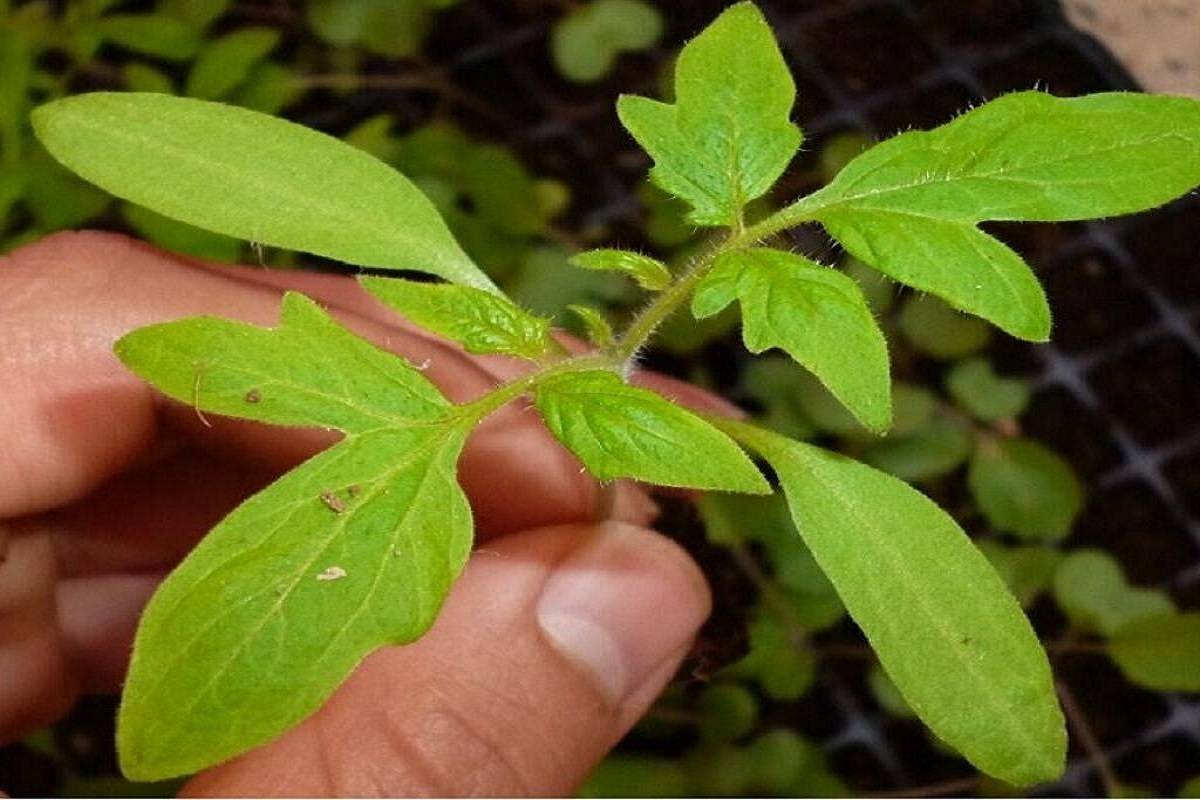
I hope you find this article (Growing in Sawdust: Alternative planting Medium in Vertical farming) useful.
Here it is some of my articles you can find them:
- Vertical Farming with Artificial Light: Review and Future Advancement.
- Healthy Food Production Challenges in Developing Countries.
- In vitro Regeneration of Alstroemeria cv. ‘Balance’ by Indirect Organogenesis.
- In vitro Regeneration of Alstroemeria cv. ‘Balance’ Based on Direct Organogenesis.
- Innovative Optimal Approach to Implement Fast Propagation Tissue Culture.
Feel free to contact me for questions, consulting or any projects.
Email: hossein_nazarian@yahoo.com
Email: hossein.nazarian@cademix.org
LinkedIn: https://www.linkedin.com/in/hossein-nazarian/
Xing: https://www.xing.com/profile/Hossein_Nazarian
About the Author
Hossein Nazarian is a graduate of MSc. in Agricultural Biotechnology Engineering from Iran and an associate member at the Cademix Institute of Technology and the Cademix Career Autopilot Program.
He has also obtained his bachelor diploma in Plant Production Engineering which has provided him with an understanding of different aspects of agriculture. For instance he was working on cultivation, irrigation, fertilization, plant protection and commercial services. He has been working in several areas in agricultural sector since 2009. He also has valuable experiences as an instructor and technical expert in plant pests, diseases, nutrition, and plant protection programs. Also He he has some experiences in the greenhouse cultures and plantlets produce through artificial light in the shelves. Moreover, he has been working in agribusinesses for 12 years and try to solve farmers’ problems. Further he helps to produce healthy products to improve the health level of society.
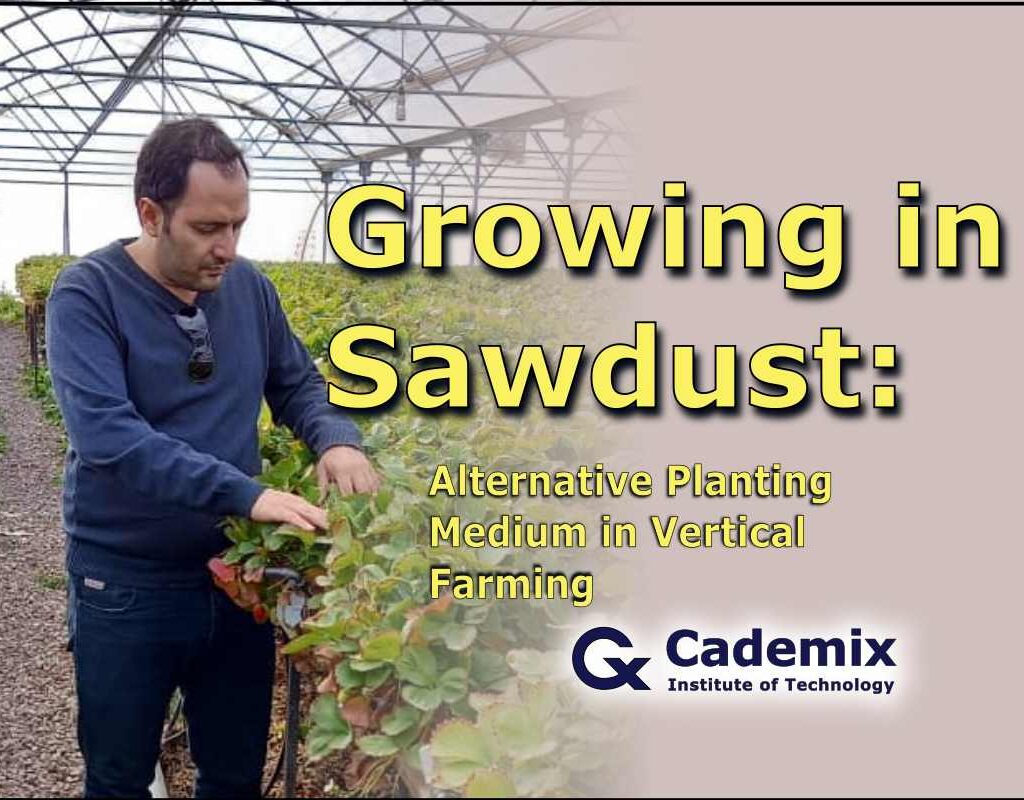
Specialties: Plant nutrition, Plant protection, Field management. Greenhouse consultant (rose, cucumber, strawberry, transplant,…), Tissue culture, Marketing, Agile management.
Keywords related to Growing in sawdust
Planting medium, Sawdust, Coco peat, Hydroponic, Artificial light, Growth chamber, Urban farming, Greenhouse culture, Vertical garden. Vertical green, Vertical gardening, Artificial light for plants are some of the keywords. Further keywords, Hydroponic system, Hydroponic garden, Hydroponic design, Hydroponic greenhouse, Arable land.
Soil deterioration, globe in the future, Creative solutions, Indoor, Indoor plants, Indoor garden, Indoor greenhouse, Shelf greenhouse, Controlled environment. In addition, controlled environment agriculture, Controlled environment technologies, Multilayer plant production, Lettuce, Aromatic plants. Further, Culinary condiments, Microgreens, Sprouts, Baby vegetables, Energy-efficient LED lights, Photosynthesis, Photosynthetic Active Radiation, Electromagnetic waves, Visible light. Finally other keywords are Plant pigments, Photoreceptors, Photosynthesis, Spectrum, Chlorophyll, Phytochromes, Fluorescents.

